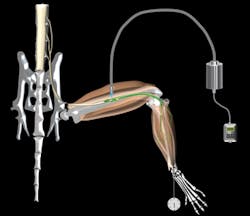A new method that uses light to control muscles holds potential to restore function to muscle tissue paralyzed by conditions such as spinal cord injury and motor neuron diseases, including amyotrophic lateral sclerosis (ALS). Developed at University College London (UCL) and King's College London (England), the technique involves transplantation of motor neurons created from stem cells into injured nerve branches.1 Engineered to react to blue light, the neurons allow for fine-tuning of muscle control by adjusting intensity, duration, and frequency of the light pulses.
In experiments on mice with damage to nerves that control muscles in their hind legs, transplanted motor neurons grew along the injured nerves to connect successfully with the paralyzed muscles. "Following the new procedure, we saw previously paralyzed leg muscles start to function" upon the application of light, said Professor Linda Greensmith of the MRC Centre for Neuromuscular Diseases at UCL's Institute of Neurology, who co-led the study.
Existing techniques use electricity to stimulate nerves, which can be painful and often results in rapid muscle fatigue. Light has no such effect. And if the existing motor neurons are lost due to injury or disease, electrical stimulation is useless. "This new technique represents a means to restore the function of specific muscles following paralyzing neurological injuries or disease," she explained.
Within five years or so, the team hopes to take the approach into human trials, with a goal of developing treatments for patients with motor neuron diseases. Because many such patients lose the ability to breathe when their diaphragm muscles become paralyzed, the researchers eventually hope to use the method to create "a sort of optical pacemaker for the diaphragm," Greensmith said.
Dr. Ivo Lieberam of the MRC Centre for Developmental Neurobiology at King's College London, co-leader of the study, created the light-responsive motor neurons from stem cells. "First, we equipped the cells with a molecular light sensor. This enables us to control motor neurons with blue light flashes. We then built a survival gene into them, which helps the stem-cell motor neurons to stay alive when they are transplanted inside the injured nerve and allows them to grow to connect to muscle."
1. J. B. Bryson et al., Science, 344, 6179, 94–97 (2014).

